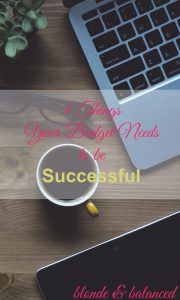 Does your budget need a makeover? Or here’s a better question, do you live on a budget? Living on a budget is so important for your financial worthiness and independence because it means you can afford to have a slip up and stop living pay check to pay check.
Does your budget need a makeover? Or here’s a better question, do you live on a budget? Living on a budget is so important for your financial worthiness and independence because it means you can afford to have a slip up and stop living pay check to pay check.
However living on a budget is not easy. Trust me I know. It took me a good 30 years to learn how to spend responsibly, just say no and properly manage my money so I always have money in the bank. O.K. 30 years is a bit of an exaggeration because I’m only 35 years old, but you get the point.
Over the years I’ve been a broke college student, a successful young professional, an in debt young adult and now a woman who is finally at peace with her money. Along the way I’ve learned a thing or two about how to budget: what it means, how to do it and what you don’t need to spend money on. Today I’m sharing all my secrets with you.
Here’s the brief story of how to live on a budget and still enjoy your life:
Price your utilities
One of the biggest mistakes we can make when setting a budget is to pay whatever the cable, electric or cell phone company tells us we need to. Negotiate with everyone…your budget needs it to be successful.
I have been known to overpay for both my cable and cell phone. We don’t need the biggest cable package because we can only watch one channel at a time and – HELLO Netflix which is a much cheaper option.
Set spending limits
Please don’t spend money on whatever you want, even if it’s on sale it’s still a waste of money if you don’t need it. Set spending limits on all your expenses and don’t let yourself go over, no matter what.
I admittedly spend a lot of money on eating out, especially at lunch with friends. I’ve started trying to make my favorite store bought lunches at home and trust me your budget needs this if you eat out like I do. Although it’s not the same feeling as sitting at a restaurant with my friends, it is saving a lot of money.
Use a budget software
If you aren’t sure where all your money goes then track it. Use a budget software, a spreadsheet or a pen and paper to record where you’re spending money. Once you see it in black and white you can spot trends, learn what to avoid and make cuts.
This is a similar habit to tracking your calorie intake if you’re trying to lose weight. Eventually you won’t want to continue writing down every single $3 magazine or $5 coffee you spend money on and therefore you’ll just stop spending.
Account for debt repayments
If you really want to pay off your debt then your budget needs to put the payments into your monthly expenses. If you set up automatic payments from your checking account to your credit cards they will always be paid and you’ll never need to worry about finding the money on the due date because you’ve factored the payments into your monthly budget.






